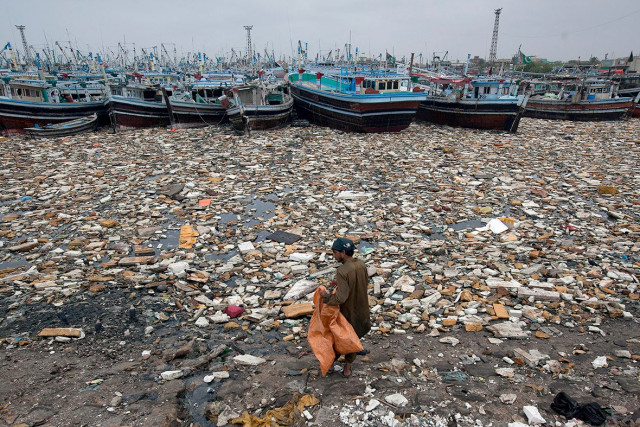Land of the impure
The government needs to revisit legislation on controlling pollution at all micro and macro levels

Official recycling programmes will prove advantageous to overcoming the pollution problem, which might not be a difficult feat if Pakistan could get all relevant stakeholders on board. PHOTO: REUTERS
Despite many Pakistanis touting their country as being the Land of the Pure and there being an obsessive, ubiquitous culture of keeping housecleaning staff who work daily dusting, sweeping and mopping, we are ultimately the land of the impure. In this survey, the impurity was measured by the concentration of disease-causing toxins in the air, with Pakistan maintaining the highest concentration of air toxins in the air pollution database. To combat the debilitating effects of air pollution, we need to create awareness among the public at the grassroots level to instill in it consciousness of the far-reaching impact of pollution; the wadded up piece of paper that one throws out of their car window today could be a potential cause for serious illness for any number of people in the future. Factories and businesses also require awareness so as to change their detrimental policies with regard to waste disposal. In this regard, what is really needed is strict implementation of laws governing industrial and household waste disposal. The government needs to revisit legislation on controlling pollution at all micro and macro levels, with the provision of levying heavy fines on instigators. Pakistan can learn from nations like Japan, where trash and recyclables require categorisation by tenants before collection. Official recycling programmes will prove advantageous to overcoming the pollution problem, which might not be a difficult feat if Pakistan could get all relevant stakeholders on board.
Published in The Express Tribune, August 7th, 2015.
Like Opinion & Editorial on Facebook, follow @ETOpEd on Twitter to receive all updates on all our daily pieces.














COMMENTS
Comments are moderated and generally will be posted if they are on-topic and not abusive.
For more information, please see our Comments FAQ